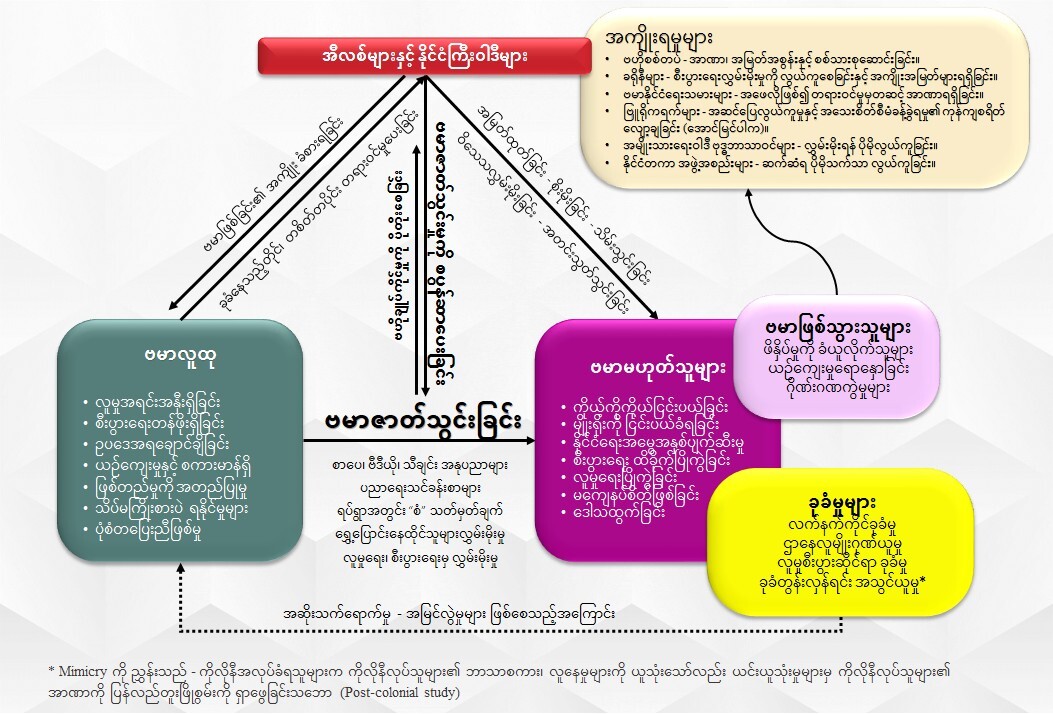- Published on
Holacracy ဟာ အဖွဲ့အစည်း တခုကို လုပ်ငန်းလုပ်ဆောင်ဖို့ လုံးဝ ကွဲပြားတဲ့ နည်းလမ်းတခုကို ပေးတယ်။ လူတွေရဲ့ အခိုင်အမာသုံးတဲ့ အလွှာခွဲစနစ်အစား Holacracy ပုံစံမှာ အာဏာနဲ့ ဆုံးဖြတ်ချက်ချနိုင်တဲ့ စွမ်းအားကို အဖွဲ့အစည်း တခုလုံးမှာ ဖြန့်ဝေထားတယ်၊ ပုံသေ အလုပ် ရာထူးတွေနဲ့ ဌာနတွေထက် လှုပ်ရှားနေတဲ့ အခန်းကဏ္ဍတွေနဲ့ "အဝန်းအဝိုင်းတွေ" အပေါ် အခြေခံပြီးတော့ လုပ်တယ်။ ဒါဟာ ပိုပြီး တက်ကြွသွက်လက်တဲ့၊ လိုက်လျောညီထွေရှိတဲ့နဲ့ ရည်ရွယ်ချက်ရှိတဲ့ စနစ်တခု ဖြစ်အောင် ဒီဇိုင်းထုတ်ထားတာ ဖြစ်တယ်၊ လူ နည်းနည်းလေးကပဲ ထိန်းချုပ်မှုအားလုံးကို ကိုင်ထားတဲ့ စိတ်ကူးကနေ အလုပ်တကယ် ဖြစ်တဲ့နေရာကိုပေးတဲ့ ဘောင်တခုဆီ ရွေ့လျားတာ ဖြစ်တယ်။
Holacracy ရဲ့ အဓိက စိတ်ကူးတွေထဲက တခုက အလုပ်ကို သီးခြား အခန်းကဏ္ဍတွေပေါ် အခြေခံပြီး စနစ်တကျ လုပ်တာပဲ၊ အခန်းကဏ္ဍတိုင်းမှာ ရှင်းလင်းတဲ့ ရည်ရွယ်ချက်၊ သတ်မှတ်ထားတဲ့ တာဝန်တွေနဲ့ အာဏာ နယ်ပယ်တွေ ရှိတယ်။ လူတွေမှာ တင်းကျပ်တဲ့ အလုပ်ဖော်ပြချက်တွေ မရှိဘူး၊ အဲဒီအစား သူတို့ဟာ မတူညီတဲ့ အဝန်းအဝိုင်းတွေမှာ အခန်းကဏ္ဍ အများကြီးကို ကိုင်ဆောင်နိုင်တယ်။ အဝန်းအဝိုင်းတွေဟာ သီးခြား လုပ်ငန်းဆောင်တာ ဒါမှမဟုတ် ပရောဂျက်တခုကို အာရုံစိုက်ထားတဲ့ ကိုယ်တိုင်စီမံခန့်ခွဲတဲ့ အဖွဲ့တွေလို ဖြစ်တယ်။ ဒီ အဝန်းအဝိုင်းတွေဟာ အလွှာလိုက် ရှိနေပြီး ပိုကြီးတဲ့ အဖွဲ့အစည်း တခုလုံးမှာ တညီတညွတ်တည်း ဖြစ်ဖို့ သူတို့ကြား ချိတ်ဆက်မှုတွေ ရှိတယ်။
Holacracy ထဲမှာ ဆုံးဖြတ်ချက်ချတာဟာ လုပ်ငန်းဆိုင်ရာ ကိစ္စရပ် အများစုအတွက် အားလုံး သဘောတူညီမှု ဒါမှမဟုတ် မန်နေဂျာရဲ့ ခွင့်ပြုချက်အပေါ် မှီခိုတာ မဟုတ်ဘူး။ အဲဒီအစား ဒါဟာ စနစ်တကျ လုပ်ဆောင်တဲ့ အစည်းအဝေး လုပ်ငန်းစဉ်တွေကို သုံးတယ်။ အလုပ်တွေ ပြီးမြောက်ဖို့အတွက် "နည်းဗျူဟာ အစည်းအဝေး" နဲ့ အဖွဲ့အစည်းရဲ့ ဖွဲ့စည်းပုံနဲ့ စည်းမျဉ်းတွေကို ပြောင်းလဲဖို့အတွက် "အုပ်ချုပ်မှု အစည်းအဝေး" ကို အထူးသဖြင့် သုံးတယ်။ ဒီ အစည်းအဝေးတွေမှာ တင်းမာမှုတွေ (ပြဿနာတွေ ဒါမှမဟုတ် အခွင့်အလမ်းတွေ) ကို လျင်မြန် ထိရောက်စွာ လုပ်ဆောင်ဖို့ ဒီဇိုင်းထုတ်ထားတဲ့ ရှင်းလင်းတဲ့ စည်းမျဉ်းတွေနဲ့ ပုံစံတွေ ရှိတယ်၊ ဒါက ဆက်တိုက် ပိုကောင်းအောင် လုပ်တာနဲ့ လိုက်လျောညီထွေ ဖြစ်တာကို ခွင့်ပြုတယ်။
အဖွဲ့အစည်းတွေ Holacracy ကို ဘာလို့ ရွေးချယ် ကျင့်သုံးရသလဲ ဆိုတဲ့ ခိုင်မာတဲ့ အကြောင်းပြချက်တွေ ရှိတယ်။ အဓိက အကျိုးကျေးဇူးတခုက ပိုပြီး တက်ကြွသွက်လက်လာတာနဲ့ ပြောင်းလဲမှုတွေကို လိုက်လျောညီထွေ တုံ့ပြန်နိုင်တာ ဖြစ်တယ်။ ဆုံးဖြတ်ချက်ချနိုင်တဲ့ အာဏာကို အလုပ်နဲ့ ပိုနီးစပ်တဲ့ အခန်းကဏ္ဍတွေနဲ့ အဝန်းအဝိုင်းတွေဆီ ဖြန့်ဝေထားတဲ့အတွက် အဖွဲ့တွေဟာ ပြဿနာတွေနဲ့ အခွင့်အလမ်းတွေကို ဖော်ထုတ်ပြီး ရိုးရာမြင်နေကျ အဆင့်ဆင့်အလွှာစနစ်လို ဖွဲ့စည်းပုံမျိုးထက် ပိုပြီး လျင်မြန်စွာ လိုအပ်တဲ့ ချိန်ညှိမှုတွေ လုပ်နိုင်တယ်။ ဒါက အဖွဲ့အစည်းကို ပတ်ဝန်းကျင်ရဲ့ ပြောင်းလဲနေတဲ့ အခြေအနေတွေနဲ့ လျင်မြန်စွာ လိုက်လျောညီထွေ ဖြစ်အောင် လုပ်နိုင်တယ်။ Holacracy ဟာ လူပုဂ္ဂိုလ်တွေကို သူတို့ရဲ့ သတ်မှတ်ထားတဲ့ အခန်းကဏ္ဍတွေထဲမှာ ရှင်းလင်းတဲ့ အာဏာ ပေးခြင်းအားဖြင့် သူတို့ကို စွမ်းအားမြှင့်ပေးဖို့လည်း ရည်ရွယ်တယ်။ ဒါက ပိုင်ဆိုင်မှုရှိတယ်၊ ငါပါတယ်ဆိုတဲ့ ခံစားချက်အစပြု လုပ်ဆောင်တာနဲ့ ရည်ရွယ်ချက် ခံစားချက်တွေ ပိုများလာစေနိုင်တယ်။ ဘာလို့လဲဆိုတော့ လူတွေဟာ အမြဲတမ်း ခွင့်ပြုချက် တောင်းခံနေတာထက် သူတို့ နယ်ပယ်ထဲမှာ ဆုံးဖြတ်ချက်တွေ ချဖို့ ယုံကြည်အပ်နှံခံရလို့ပါပဲ။ ရှင်းလင်းတဲ့ အခန်းကဏ္ဍတွေနဲ့ တာဝန်ခံမှုတွေအပေါ် အာရုံစိုက်တာဟာ ဝိုးတဝါးဖြစ်မှုနဲ့ အတွင်းပိုင်းက ပါဝါလွန်ဆွဲတာတွေကိုလည်း လျှော့ချနိုင်တယ်၊ ဒါကလည်း တာဝန်တွေနဲ့ ဆုံးဖြတ်ပိုင်ခွင့်တွေကို ရှင်းရှင်းလင်းလင်း သတ်မှတ်ထားလို့ပါ။ တင်းမာမှုတွေကို ဖော်ထုတ်ဖို့နဲ့ ဆုံးဖြတ်လုပ်ဆောင်ဖို့ ဘောင်တခု ပေးခြင်းအားဖြင့် Holacracy ဟာ အလုပ်လုပ်နေတဲ့ အဖွဲ့တွေ အတွင်းကနေ စဉ်ဆက်မပြတ် တိုးတက်ကောင်းမွန်အောင်လုပ်တာနဲ့ ဆန်းသစ်တီထွင်မှုကို အားပေးတယ်။
Holacracy ကို အကောင်အထည်ဖော်တာဟာ အဖွဲ့အစည်းဆိုင်ရာ ကြီးမားတဲ့ အပြောင်းအလဲ ဖြစ်တယ်၊ ကတိကဝတ်နဲ့ စနစ်တကျ ချဉ်းကပ်မှု လိုအပ်တယ်။ ပထမ အဆင့်မှာ များသောအားဖြင့် ခေါင်းဆောင်ပိုင်းက Holacracy ရဲ့ နိယာမတွေကို နားလည်ပြီး ကျင့်သုံးရေး ကတိကဝတ် ပြုဖို့ပဲ၊ သူတို့ရဲ့ ထောက်ခံမှုဟာ ကူးပြောင်းဖို့အတွက် အရမ်း အရေးကြီးတယ်။ ဒီကနေမှ များသောအားဖြင့် အဖွဲ့အစည်း တခုလုံးမှာ ရှိတဲ့ လူတိုင်းကို Holacracy ရဲ့ အဓိက အယူအဆတွေ၊ စည်းမျဉ်းတွေနဲ့ အစည်းအဝေး လုပ်ဆောင်မှုတွေကို နားလည်ဖို့ လေ့ကျင့်ပေးတာနဲ့ ဆက်လုပ်ရတယ်။ ပြီးတော့ အဖွဲ့အစည်းဟာ သူ့ရဲ့ ကနဦး ဖွဲ့စည်းပုံကို သတ်မှတ်တာ၊ အဓိက လုပ်ငန်းဆောင်တာတွေကို ဖော်ထုတ်တာ ပြီးတော့ ဒါတွေကို အဝန်းအဝိုင်းတွေအဖြစ် စနစ်တကျ တည်ဆောက်တာ၊ အဲဒီ အဝန်းအဝိုင်းတွေထဲမှာ ကနဦး အခန်းကဏ္ဍတွေကို သတ်မှတ်တာ စတင်တယ်။ ပြီးတော့ လူတွေဟာ သူတို့ရဲ့ အရည်အချင်းတွေနဲ့ အဖွဲ့အစည်းရဲ့ လိုအပ်ချက်တွေပေါ် အခြေခံပြီး ဒီအခန်းကဏ္ဍတွေကို "တာဝန်ယူ" ကြတယ်။
အကောင်အထည်ဖော်မှုရဲ့ အရေးကြီးတဲ့ အစိတ်အပိုင်းက Holacracy ရဲ့ သီးခြား အစည်းအဝေး ပုံစံတွေကို ဆက်တိုက် လေ့ကျင့်တာပါပဲ။ လုပ်ငန်းဆိုင်ရာ ညှိနှိုင်းမှုအတွက် နည်းဗျူဟာ အစည်းအဝေးတွေနဲ့ အခန်းကဏ္ဍတွေနဲ့ အဝန်းအဝိုင်း ဖွဲ့စည်းပုံကို ပြောင်းလဲဖို့ အုပ်ချုပ်မှု အစည်းအဝေးတွေလုပ်ရမယ်။ ဒီ ဆက်တိုက် လေ့ကျင့်မှုဟာ အလုပ်လုပ်တဲ့ နည်းလမ်းအသစ်ကို အုတ်မြစ်ထည့်သွင်းဖို့ အဓိကကျတယ်။ အဖွဲ့အစည်းဟာ Holacracy အောက်မှာ လည်ပတ်နေတာနဲ့အမျှ ဖွဲ့စည်းပုံဟာ ပုံသေ မဟုတ်ဘူး၊ တင်းမာမှုတွေကို ဖော်ထုတ်ပြီး ယူထားတဲ့ အခန်းကဏ္ဍတွေနဲ့ အဝန်းအဝိုင်းတွေမှာ အဖွဲ့အစည်းရဲ့ ရည်ရွယ်ချက်ကို ပိုအကျိုးပြုဖို့ ပြန်လည် သတ်မှတ်နေတဲ့အတွက် အုပ်ချုပ်မှု လုပ်ငန်းစဉ်ဖြစ်တာမို့ သဘောအားဖြင့် ဆက်တိုက် ပြောင်းလဲနေတယ်။ တင်းမာမှုတွေကို သိရှိပြီး ချိန်ညှိမှုတွေ အမြဲလုပ်ရတဲ့ ထပ်ခါတလဲလဲ လုပ်ငန်းစဉ်ဟာ Holacracy ဘယ်လို လက်တွေ့မှာ အလုပ်လုပ်တယ်ဆိုတာရဲ့ အခြေခံပဲ။
အချုပ်အားဖြင့် Holacracy ဟာ ရိုးရာ စီမံခန့်ခွဲမှု အဆင့်ဆင့်အလွှာစနစ်ကို ကိုယ်ပိုင် စီမံခန့်ခွဲတဲ့ အဝန်းအဝိုင်းတွေနဲ့ အာဏာ ဖြန့်ဝေထားတဲ့၊ လှုပ်ရှားနေတဲ့ ဖွဲ့စည်းမှုတခုနဲ့ အစားထိုးတဲ့ အဖွဲ့အစည်းဆိုင်ရာ အုပ်ချုပ်မှု စနစ်တခု ဖြစ်တယ်။ ဒါဟာ ပိုပြီး တက်ကြွသွက်လက်လာအောင် လုပ်ဖို့၊ လူပုဂ္ဂိုလ်တွေကို စွမ်းအားမြှင့်ပေးဖို့၊ တာဝန်ခံမှု ပိုရှင်းလင်းလာအောင် လုပ်ဖို့နဲ့ လိုက်လျောညီထွေ ဖြစ်တာကို မြှင့်တင်ဖို့ ဒီဇိုင်းထုတ်ထားတာ ဖြစ်တယ်။ ဒါကို အကောင်အထည်ဖော်တဲ့နေရာမှာ အဖွဲ့ဝင်တွေကို လေ့ကျင့်ဖို့နဲ့ သူ့ရဲ့ ထူးခြားတဲ့ လုပ်ငန်းစဉ်တွေကို စဉ်ဆက်မပြတ် လိုက်နာဖို့ အထူး ကြိုးစားအားထုတ်မှု လိုအပ်ပေမဲ့ Holacracy ဟာ အလွှာဆင့်စနစ်ရဲ့ ကန့်သတ်မှုတွေကနေ ပိုပြီး ပျော့ပြောင်းတဲ့၊ ရည်ရွယ်ချက် ဦးတည်တဲ့နဲ့ ပြောင်းလဲမှုတွေကို တုံ့ပြန်နိုင်တဲ့ အလုပ်လုပ်တဲ့ နည်းလမ်းဆီ ရွေ့လျားဖို့ ကြိုးစားနေတဲ့ အဖွဲ့အစည်းတွေအတွက် တင်းတင်းကြပ်ကြပ် ဗဟိုချုပ်ကိုင်မှုမဟုတ်တဲ့ တခြားရွေးချယ်စရာတခုကို ပေးပါတယ်။
Holacracy ရဲ့ အဓိက စိတ်ကူးတွေထဲက တခုက အလုပ်ကို သီးခြား အခန်းကဏ္ဍတွေပေါ် အခြေခံပြီး စနစ်တကျ လုပ်တာပဲ၊ အခန်းကဏ္ဍတိုင်းမှာ ရှင်းလင်းတဲ့ ရည်ရွယ်ချက်၊ သတ်မှတ်ထားတဲ့ တာဝန်တွေနဲ့ အာဏာ နယ်ပယ်တွေ ရှိတယ်။ လူတွေမှာ တင်းကျပ်တဲ့ အလုပ်ဖော်ပြချက်တွေ မရှိဘူး၊ အဲဒီအစား သူတို့ဟာ မတူညီတဲ့ အဝန်းအဝိုင်းတွေမှာ အခန်းကဏ္ဍ အများကြီးကို ကိုင်ဆောင်နိုင်တယ်။ အဝန်းအဝိုင်းတွေဟာ သီးခြား လုပ်ငန်းဆောင်တာ ဒါမှမဟုတ် ပရောဂျက်တခုကို အာရုံစိုက်ထားတဲ့ ကိုယ်တိုင်စီမံခန့်ခွဲတဲ့ အဖွဲ့တွေလို ဖြစ်တယ်။ ဒီ အဝန်းအဝိုင်းတွေဟာ အလွှာလိုက် ရှိနေပြီး ပိုကြီးတဲ့ အဖွဲ့အစည်း တခုလုံးမှာ တညီတညွတ်တည်း ဖြစ်ဖို့ သူတို့ကြား ချိတ်ဆက်မှုတွေ ရှိတယ်။
Holacracy ထဲမှာ ဆုံးဖြတ်ချက်ချတာဟာ လုပ်ငန်းဆိုင်ရာ ကိစ္စရပ် အများစုအတွက် အားလုံး သဘောတူညီမှု ဒါမှမဟုတ် မန်နေဂျာရဲ့ ခွင့်ပြုချက်အပေါ် မှီခိုတာ မဟုတ်ဘူး။ အဲဒီအစား ဒါဟာ စနစ်တကျ လုပ်ဆောင်တဲ့ အစည်းအဝေး လုပ်ငန်းစဉ်တွေကို သုံးတယ်။ အလုပ်တွေ ပြီးမြောက်ဖို့အတွက် "နည်းဗျူဟာ အစည်းအဝေး" နဲ့ အဖွဲ့အစည်းရဲ့ ဖွဲ့စည်းပုံနဲ့ စည်းမျဉ်းတွေကို ပြောင်းလဲဖို့အတွက် "အုပ်ချုပ်မှု အစည်းအဝေး" ကို အထူးသဖြင့် သုံးတယ်။ ဒီ အစည်းအဝေးတွေမှာ တင်းမာမှုတွေ (ပြဿနာတွေ ဒါမှမဟုတ် အခွင့်အလမ်းတွေ) ကို လျင်မြန် ထိရောက်စွာ လုပ်ဆောင်ဖို့ ဒီဇိုင်းထုတ်ထားတဲ့ ရှင်းလင်းတဲ့ စည်းမျဉ်းတွေနဲ့ ပုံစံတွေ ရှိတယ်၊ ဒါက ဆက်တိုက် ပိုကောင်းအောင် လုပ်တာနဲ့ လိုက်လျောညီထွေ ဖြစ်တာကို ခွင့်ပြုတယ်။
အဖွဲ့အစည်းတွေ Holacracy ကို ဘာလို့ ရွေးချယ် ကျင့်သုံးရသလဲ ဆိုတဲ့ ခိုင်မာတဲ့ အကြောင်းပြချက်တွေ ရှိတယ်။ အဓိက အကျိုးကျေးဇူးတခုက ပိုပြီး တက်ကြွသွက်လက်လာတာနဲ့ ပြောင်းလဲမှုတွေကို လိုက်လျောညီထွေ တုံ့ပြန်နိုင်တာ ဖြစ်တယ်။ ဆုံးဖြတ်ချက်ချနိုင်တဲ့ အာဏာကို အလုပ်နဲ့ ပိုနီးစပ်တဲ့ အခန်းကဏ္ဍတွေနဲ့ အဝန်းအဝိုင်းတွေဆီ ဖြန့်ဝေထားတဲ့အတွက် အဖွဲ့တွေဟာ ပြဿနာတွေနဲ့ အခွင့်အလမ်းတွေကို ဖော်ထုတ်ပြီး ရိုးရာမြင်နေကျ အဆင့်ဆင့်အလွှာစနစ်လို ဖွဲ့စည်းပုံမျိုးထက် ပိုပြီး လျင်မြန်စွာ လိုအပ်တဲ့ ချိန်ညှိမှုတွေ လုပ်နိုင်တယ်။ ဒါက အဖွဲ့အစည်းကို ပတ်ဝန်းကျင်ရဲ့ ပြောင်းလဲနေတဲ့ အခြေအနေတွေနဲ့ လျင်မြန်စွာ လိုက်လျောညီထွေ ဖြစ်အောင် လုပ်နိုင်တယ်။ Holacracy ဟာ လူပုဂ္ဂိုလ်တွေကို သူတို့ရဲ့ သတ်မှတ်ထားတဲ့ အခန်းကဏ္ဍတွေထဲမှာ ရှင်းလင်းတဲ့ အာဏာ ပေးခြင်းအားဖြင့် သူတို့ကို စွမ်းအားမြှင့်ပေးဖို့လည်း ရည်ရွယ်တယ်။ ဒါက ပိုင်ဆိုင်မှုရှိတယ်၊ ငါပါတယ်ဆိုတဲ့ ခံစားချက်အစပြု လုပ်ဆောင်တာနဲ့ ရည်ရွယ်ချက် ခံစားချက်တွေ ပိုများလာစေနိုင်တယ်။ ဘာလို့လဲဆိုတော့ လူတွေဟာ အမြဲတမ်း ခွင့်ပြုချက် တောင်းခံနေတာထက် သူတို့ နယ်ပယ်ထဲမှာ ဆုံးဖြတ်ချက်တွေ ချဖို့ ယုံကြည်အပ်နှံခံရလို့ပါပဲ။ ရှင်းလင်းတဲ့ အခန်းကဏ္ဍတွေနဲ့ တာဝန်ခံမှုတွေအပေါ် အာရုံစိုက်တာဟာ ဝိုးတဝါးဖြစ်မှုနဲ့ အတွင်းပိုင်းက ပါဝါလွန်ဆွဲတာတွေကိုလည်း လျှော့ချနိုင်တယ်၊ ဒါကလည်း တာဝန်တွေနဲ့ ဆုံးဖြတ်ပိုင်ခွင့်တွေကို ရှင်းရှင်းလင်းလင်း သတ်မှတ်ထားလို့ပါ။ တင်းမာမှုတွေကို ဖော်ထုတ်ဖို့နဲ့ ဆုံးဖြတ်လုပ်ဆောင်ဖို့ ဘောင်တခု ပေးခြင်းအားဖြင့် Holacracy ဟာ အလုပ်လုပ်နေတဲ့ အဖွဲ့တွေ အတွင်းကနေ စဉ်ဆက်မပြတ် တိုးတက်ကောင်းမွန်အောင်လုပ်တာနဲ့ ဆန်းသစ်တီထွင်မှုကို အားပေးတယ်။
Holacracy ကို အကောင်အထည်ဖော်တာဟာ အဖွဲ့အစည်းဆိုင်ရာ ကြီးမားတဲ့ အပြောင်းအလဲ ဖြစ်တယ်၊ ကတိကဝတ်နဲ့ စနစ်တကျ ချဉ်းကပ်မှု လိုအပ်တယ်။ ပထမ အဆင့်မှာ များသောအားဖြင့် ခေါင်းဆောင်ပိုင်းက Holacracy ရဲ့ နိယာမတွေကို နားလည်ပြီး ကျင့်သုံးရေး ကတိကဝတ် ပြုဖို့ပဲ၊ သူတို့ရဲ့ ထောက်ခံမှုဟာ ကူးပြောင်းဖို့အတွက် အရမ်း အရေးကြီးတယ်။ ဒီကနေမှ များသောအားဖြင့် အဖွဲ့အစည်း တခုလုံးမှာ ရှိတဲ့ လူတိုင်းကို Holacracy ရဲ့ အဓိက အယူအဆတွေ၊ စည်းမျဉ်းတွေနဲ့ အစည်းအဝေး လုပ်ဆောင်မှုတွေကို နားလည်ဖို့ လေ့ကျင့်ပေးတာနဲ့ ဆက်လုပ်ရတယ်။ ပြီးတော့ အဖွဲ့အစည်းဟာ သူ့ရဲ့ ကနဦး ဖွဲ့စည်းပုံကို သတ်မှတ်တာ၊ အဓိက လုပ်ငန်းဆောင်တာတွေကို ဖော်ထုတ်တာ ပြီးတော့ ဒါတွေကို အဝန်းအဝိုင်းတွေအဖြစ် စနစ်တကျ တည်ဆောက်တာ၊ အဲဒီ အဝန်းအဝိုင်းတွေထဲမှာ ကနဦး အခန်းကဏ္ဍတွေကို သတ်မှတ်တာ စတင်တယ်။ ပြီးတော့ လူတွေဟာ သူတို့ရဲ့ အရည်အချင်းတွေနဲ့ အဖွဲ့အစည်းရဲ့ လိုအပ်ချက်တွေပေါ် အခြေခံပြီး ဒီအခန်းကဏ္ဍတွေကို "တာဝန်ယူ" ကြတယ်။
အကောင်အထည်ဖော်မှုရဲ့ အရေးကြီးတဲ့ အစိတ်အပိုင်းက Holacracy ရဲ့ သီးခြား အစည်းအဝေး ပုံစံတွေကို ဆက်တိုက် လေ့ကျင့်တာပါပဲ။ လုပ်ငန်းဆိုင်ရာ ညှိနှိုင်းမှုအတွက် နည်းဗျူဟာ အစည်းအဝေးတွေနဲ့ အခန်းကဏ္ဍတွေနဲ့ အဝန်းအဝိုင်း ဖွဲ့စည်းပုံကို ပြောင်းလဲဖို့ အုပ်ချုပ်မှု အစည်းအဝေးတွေလုပ်ရမယ်။ ဒီ ဆက်တိုက် လေ့ကျင့်မှုဟာ အလုပ်လုပ်တဲ့ နည်းလမ်းအသစ်ကို အုတ်မြစ်ထည့်သွင်းဖို့ အဓိကကျတယ်။ အဖွဲ့အစည်းဟာ Holacracy အောက်မှာ လည်ပတ်နေတာနဲ့အမျှ ဖွဲ့စည်းပုံဟာ ပုံသေ မဟုတ်ဘူး၊ တင်းမာမှုတွေကို ဖော်ထုတ်ပြီး ယူထားတဲ့ အခန်းကဏ္ဍတွေနဲ့ အဝန်းအဝိုင်းတွေမှာ အဖွဲ့အစည်းရဲ့ ရည်ရွယ်ချက်ကို ပိုအကျိုးပြုဖို့ ပြန်လည် သတ်မှတ်နေတဲ့အတွက် အုပ်ချုပ်မှု လုပ်ငန်းစဉ်ဖြစ်တာမို့ သဘောအားဖြင့် ဆက်တိုက် ပြောင်းလဲနေတယ်။ တင်းမာမှုတွေကို သိရှိပြီး ချိန်ညှိမှုတွေ အမြဲလုပ်ရတဲ့ ထပ်ခါတလဲလဲ လုပ်ငန်းစဉ်ဟာ Holacracy ဘယ်လို လက်တွေ့မှာ အလုပ်လုပ်တယ်ဆိုတာရဲ့ အခြေခံပဲ။
အချုပ်အားဖြင့် Holacracy ဟာ ရိုးရာ စီမံခန့်ခွဲမှု အဆင့်ဆင့်အလွှာစနစ်ကို ကိုယ်ပိုင် စီမံခန့်ခွဲတဲ့ အဝန်းအဝိုင်းတွေနဲ့ အာဏာ ဖြန့်ဝေထားတဲ့၊ လှုပ်ရှားနေတဲ့ ဖွဲ့စည်းမှုတခုနဲ့ အစားထိုးတဲ့ အဖွဲ့အစည်းဆိုင်ရာ အုပ်ချုပ်မှု စနစ်တခု ဖြစ်တယ်။ ဒါဟာ ပိုပြီး တက်ကြွသွက်လက်လာအောင် လုပ်ဖို့၊ လူပုဂ္ဂိုလ်တွေကို စွမ်းအားမြှင့်ပေးဖို့၊ တာဝန်ခံမှု ပိုရှင်းလင်းလာအောင် လုပ်ဖို့နဲ့ လိုက်လျောညီထွေ ဖြစ်တာကို မြှင့်တင်ဖို့ ဒီဇိုင်းထုတ်ထားတာ ဖြစ်တယ်။ ဒါကို အကောင်အထည်ဖော်တဲ့နေရာမှာ အဖွဲ့ဝင်တွေကို လေ့ကျင့်ဖို့နဲ့ သူ့ရဲ့ ထူးခြားတဲ့ လုပ်ငန်းစဉ်တွေကို စဉ်ဆက်မပြတ် လိုက်နာဖို့ အထူး ကြိုးစားအားထုတ်မှု လိုအပ်ပေမဲ့ Holacracy ဟာ အလွှာဆင့်စနစ်ရဲ့ ကန့်သတ်မှုတွေကနေ ပိုပြီး ပျော့ပြောင်းတဲ့၊ ရည်ရွယ်ချက် ဦးတည်တဲ့နဲ့ ပြောင်းလဲမှုတွေကို တုံ့ပြန်နိုင်တဲ့ အလုပ်လုပ်တဲ့ နည်းလမ်းဆီ ရွေ့လျားဖို့ ကြိုးစားနေတဲ့ အဖွဲ့အစည်းတွေအတွက် တင်းတင်းကြပ်ကြပ် ဗဟိုချုပ်ကိုင်မှုမဟုတ်တဲ့ တခြားရွေးချယ်စရာတခုကို ပေးပါတယ်။
